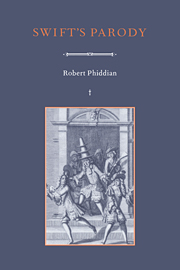Book contents
- Frontmatter
- Contents
- Acknowledgments
- List of abbreviations
- Introduction
- 1 Theoretical orientations
- 2 Restoration enterprises and their rhetorics
- 3 Parody and the play of stigma in pamphlet warfare
- 4 The problem of anarchic parody: An Argument against Abolishing Christianity
- 5 Authority and the author: the disappearing centre in Swiftian parody
- 6 Entrance to A Tale of A Tub
- 7 A Tale of A Tub as an orphaned text
- 8 A Tale of A Tub as Swift's own illegitimate issue
- Conclusion: parodic disguise and the negotiability of A Tale of A Tub
- Select bibliography
- Index
3 - Parody and the play of stigma in pamphlet warfare
Published online by Cambridge University Press: 29 September 2009
- Frontmatter
- Contents
- Acknowledgments
- List of abbreviations
- Introduction
- 1 Theoretical orientations
- 2 Restoration enterprises and their rhetorics
- 3 Parody and the play of stigma in pamphlet warfare
- 4 The problem of anarchic parody: An Argument against Abolishing Christianity
- 5 Authority and the author: the disappearing centre in Swiftian parody
- 6 Entrance to A Tale of A Tub
- 7 A Tale of A Tub as an orphaned text
- 8 A Tale of A Tub as Swift's own illegitimate issue
- Conclusion: parodic disguise and the negotiability of A Tale of A Tub
- Select bibliography
- Index
Summary
The Case the Book pointed at, was to speak in the first Person of the Party, and then, thereby, not only to speak their Language, but make them acknowledge it to be theirs, which they did so openly, that confounded all their Attempts to deny it, and to call it a Scandal thrown upon them by another.
Pamphlet warfare and appeal to public opinion became necessary in the new political world of late Stuart England, but they remained radically dubious in the eyes of many, not least because of their origin in the anarchic days of the Civil War. The languages generated in this novel forum sought to define the sort of constitution which was being ‘restored’, and so rhetorical skirmishes tested the margins of orthodox utterance, with combatants attempting to appropriate authority for their own discourse and to stigmatise as potentially treasonous the language of their opponents. Steven Zwicker has characterised this culture as inhabited by various rhetorics of disguise, and there is much truth in this analysis, for truth, conviction, and motivation were generally covert elements of texts. In this nascent public sphere writers attempted to define and dominate the terms of the developing consensus on what constituted ideological validity. The process was often, almost typically, oppositional, as various ideologues sought to draw out the infidelity implicit in their opponents' principles, to expose the Commonwealthman behind the Whig and the Jacobite behind the Tory.
- Type
- Chapter
- Information
- Swift's Parody , pp. 52 - 75Publisher: Cambridge University PressPrint publication year: 1995

